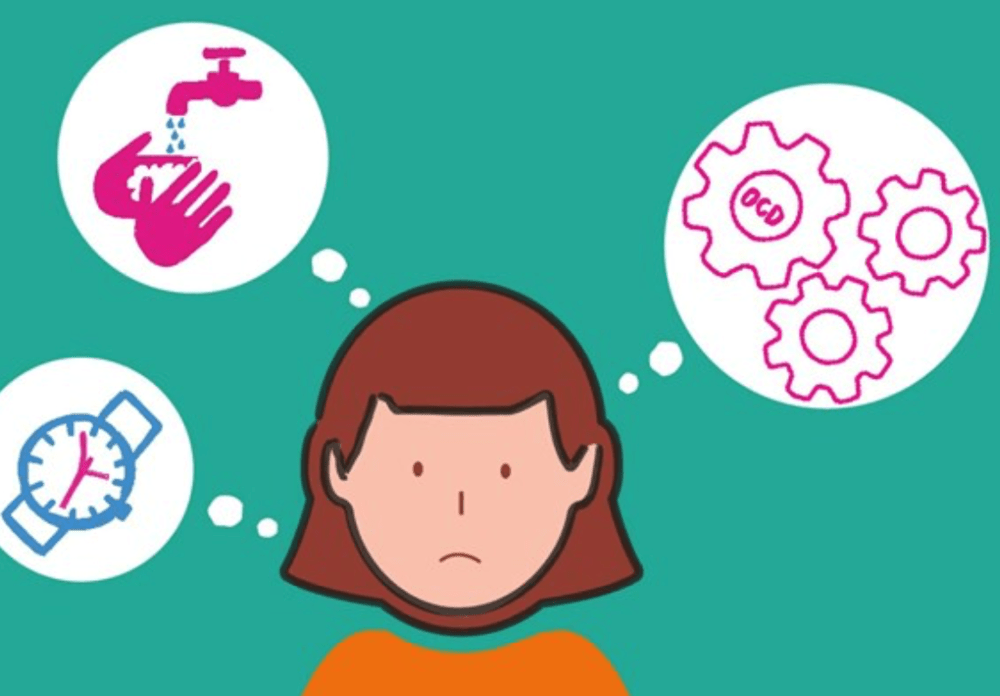If you have a teenager, there’s a good chance you’ve already noticed some of the signs of OCD. OCD, or obsessive-compulsive disorder, is one of the most common mental health disorders in young people. In this blog post, we will discuss what OCD is, the symptoms to look for, and how to get help for your teen. We will also dispel some of the myths about OCD that are commonly circulated in our society. Thank you for reading.
Contents
What Does “OCD In Teen” Means?
 OCD is a mental health disorder that is characterized by obsessive thoughts and repetitive behaviors. People with OCD often have difficulty controlling their impulses and may engage in compulsive behaviors, such as hand-washing, counting, or checking doors and windows. OCD can be a debilitating condition that interferes with daily life.
OCD is a mental health disorder that is characterized by obsessive thoughts and repetitive behaviors. People with OCD often have difficulty controlling their impulses and may engage in compulsive behaviors, such as hand-washing, counting, or checking doors and windows. OCD can be a debilitating condition that interferes with daily life.
OCD is often diagnosed in adolescence or young adulthood. It is estimated that one in every 200 children and adolescents has OCD. Boys are more likely to be diagnosed with OCD than girls, although the reason for this difference is not fully understood. Some experts believe that boys may be more likely to display overt compulsions, such as washing their hands or arranging objects. In contrast, girls may be more likely to have covert compulsions, such as mental rituals or excessive praying.
There is no single cause of OCD. Rather, it is thought to be the result of a combination of genetic and environmental factors. Some research suggests that OCD may be more common in families with a history of mental illness. Other risk factors for OCD include trauma, stress, and other psychiatric disorders.
OCD can be a difficult disorder to live with, but treatment can help. If you or someone you know is struggling with OCD, reach out to a mental health professional for help. With proper treatment, people with OCD can learn to manage their symptoms and live full and productive lives.
Signs of OCD In Teens

There are many signs of OCD in teens. Some common ones are:
Excessive hand washing or showering
One of the signs can be excessive handwashing or showering. This can be due to the fear of germs or contamination. This sign also includes avoiding touching doorknobs, light switches, or anything else that might be contaminated. There may be also many other things that can be avoided due to the fear of contamination.
Checking behaviors
Another sign of OCD in teens is checking behaviors. This can include checking to see if the door is locked, if the oven is turned off, or if the alarm is set. Checking behavior can also include repeatedly going over homework or re-reading text messages. There may be also other things that can be checked due to the fear of something bad happening.
Arranging and ordering
Another sign of OCD in teens is arranging and ordering. This can include straightening objects, organizing books, or putting clothes in a certain order. Arranging and ordering can also include making lists or needing things to be done in a certain way. Also, this sign can be seen as needing everything to be perfect.
Hoarding
Hoarding can also be a sign of OCD in teens. This includes collecting and keeping things that others might consider trash or junk. Hoarding can also include not wanting to get rid of anything, even if it is no longer needed. This may lead to clutter in the home and difficulty moving around.
Obsessive thoughts
Obsessive thoughts are another sign of OCD in teens. These are unwanted, intrusive thoughts that can cause anxiety or distress. Obsessive thoughts often center on themes of contamination, harm, or perfectionism. People with OCD may try to suppress these thoughts or engage in compulsions to relieve the anxiety they cause.
Compulsive Thoughts
An obsession is when a thought pops up over and over again. A compulsion is when you do something to try to make the thought go away. Some compulsions are mental, like counting or repeating words in your head. Others are physical, like hand-washing or locking and unlocking doors. People with OCD often feel that they have to do their compulsions just right, or something bad will happen.
Constant Worry
Constant worry can also be a sign of OCD in teens. This includes worrying about school, friends, family, or the future. People with OCD may try to control their worry by avoiding certain situations or people. They may also engage in compulsions or reassurance-seeking behaviors.
Reassurance Seeking
Reassurance seeking is when you ask others for reassurance or constantly seek out information to help ease your anxiety. For example, someone with OCD might repeatedly check social media to see if their friends are still talking to them. Or they might ask their parents repeatedly if they’re doing a good job. Reassurance seeking can be a way of trying to control your anxiety.
Intrusive Thoughts
Intrusive thoughts are unwanted, intrusive thoughts that can cause anxiety or distress. Also, Intrusive thoughts often center on themes of contamination, harm, or perfectionism. People with OCD may try to suppress these thoughts or engage in compulsions to relieve the anxiety they cause.
Avoidance
People with OCD may avoid certain activities, places, or people out of fear of triggering their obsessions. For example, someone with OCD may avoid shaking hands for fear of contamination. Or, someone with a fear of heights may avoid going to the top of tall buildings. Avoidance can lead to social isolation and make it difficult to perform daily activities.
Need for Symmetry or Exactness
There may be a need for symmetry or exactness. This can be seen when objects are lined up or need to be in a certain order. Also, this sign can be seen as needing everything to be perfect. There may be also many other things that can be avoided due to the fear of something bad happening.
These are just some of the signs of OCD in teens. If you think your teen may have OCD, it’s essential to talk to a mental health professional. With treatment, most people with OCD can learn to manage their symptoms and live full, productive lives.
Causes of OCD In Teens

There are many causes of OCD in teens, but the exact cause is unknown. Some possible causes include:
Genetics
Genetics is one of the possible causes of OCD in teens. If someone in your family has OCD, you may be more likely to develop the condition. Many people develop OCD after a stressful life event, such as the death of a loved one. These genetics are also one of the many causes that can be passed down from family members. Sometimes there maybe be more than one family member that is affected by OCD.
Environment
The environment may also play a role in the development of OCD in teens. For example, if you live in a chaotic or unpredictable environment, you may be more likely to develop OCD. This is because people with OCD often seek out structure and predictability to help ease their anxiety. Sometimes there maybe be a combination of both genetic and environmental factors that contribute to the development of OCD in teens.
Brain Structure and Functioning
Brain structure and functioning may also be a factor in the development of OCD in teens. Some research suggests that people with OCD may have differences in the way their brains process information. For example, some studies have found that people with OCD have higher activity levels in certain areas of the brain. This increased activity may make it difficult for people with OCD to ignore or suppress intrusive thoughts.
Trauma
Trauma is one of the many causes of OCD in teens. Many people who develop OCD have experienced some form of trauma, such as abuse, neglect, or a major life event. This trauma may trigger symptoms of OCD. Also, people who have OCD may be more likely to experience PTSD. Sometimes there maybe be a combination of both genetic and environmental factors that contribute to the development of OCD in teens.
Bullying
Sometimes when a person is suffering from OCD, they may be bullied due to their symptoms. For example, if a person with OCD is afraid of germs, they may be teased for being a “clean freak”. This can lead to the person withdrawing and avoiding social situations. If you think your teen is being bullied, it’s important to talk to a school counselor or mental health professional. There can also be many other causes of OCD in teens, but these are some of the most common.
Abuse
Abuse is one of the leading causes of OCD in teens. Many people who suffer from OCD have experienced some form of abuse, such as physical, emotional, or sexual abuse. This abuse may trigger symptoms of OCD. Also, people who have OCD may be more likely to experience PTSD.
Teenage Pregnancy
Pregnancy is another one of the possible causes of OCD in teens. Some research suggests that pregnant women who experience high levels of stress are more likely to have a child with OCD. Also sometimes there maybe be a combination of both genetic and environmental factors that contribute to the development of OCD in teens.
Negative Impacts of OCD In Teens

There are many negative impacts of OCD in teens. Some of these are:
Impacts Academics
One of the main negative impacts of OCD in teens is the impact on academics. Many people with OCD have difficulty concentrating on tasks and may fall behind in school. This can lead to lower grades and may eventually result in the person dropping out of school. There may be many other causes of OCD in teens, but these are some of the most common.
Impacts Social Life
Another negative impact of OCD in teens is the impact on social life. Many people with OCD may avoid social situations due to their fear of germs or other triggers. This can lead to the person withdrawing and becoming isolated. If you think your teen is suffering from OCD, it’s important to talk to a mental health professional. There can also be many other causes of OCD in teens, but these are some of the most common.
Leads to Other Mental Health Conditions
Sometimes there may be other mental health conditions that are going on with your teen. For example, anxiety and depression. It’s important to get help for your teen if you think they may be dealing with OCD. The earlier you get them help, the better chance they have of managing their OCD and other mental health conditions.
These mental health conditions also can make it hard for your teen to do well in school, make friends, and be a part of your family. So getting help for them can improve their life in many ways.
Impacts Relationships
OCD is not just hard on the person with OCD. It can also be hard on their family and friends. People with OCD often have a hard time keeping friends because of their OCD behaviors. And they may avoid spending time with family members because they’re afraid of embarrassing themselves.
Relationships are also strained because people with OCD can be very demanding. For example, they may want things done a certain way or they may want their loved ones to participate in their rituals. This can be hard for everyone involved.
Impacts Daily Life
OCD can also make it hard for people to do their daily activities. For example, going to school or work. People with OCD may miss a lot of days from school or work because of their OCD. And when they are there, they may not be able to focus on what they’re doing because of their obsessions and compulsions. It also can be hard for people with OCD to take care of their hygiene and take care of their homes.
So as you can see, OCD can have a big impact on your teen’s life. If you think your teen may be dealing with OCD, get them help from a mental health professional.
Diagnosis of OCD In Teens
Diagnosing OCD in teens can be difficult. The symptoms of OCD can be similar to those of other mental health disorders, such as anxiety or depression. A doctor will ask about your child’s symptoms and how long they’ve been present. They may also ask if any family members have OCD or another mental health disorder. Blood tests and imaging studies are not used to diagnose OCD.
There is no one test that can diagnose OCD. However, a trained mental health professional can make a diagnosis by talking to your teen and learning about their symptoms. If your teen has OCD, they may:
-Have intense fears (phobias) of specific objects or situations
-Avoid certain objects or situations because of their fears
-Have difficulty completing daily tasks at school or home because of their OCD symptoms
-Spend a lot of time carrying out rituals, such as washing their hands or checking the locks on doors
-Experience anxiety or depression because of their OCD symptoms
OCD can be diagnosed at any age. However, it is most commonly diagnosed in teens and young adults. If you think your teen may have OCD, talk to their doctor. Early diagnosis and treatment can help your teen manage their OCD symptoms and live a full life. There are also many resources available to help families deal with OCD.
One should always visit a doctor if they think that they or someone they know has OCD. Blood tests and imaging studies are not used to diagnose OCD. A trained mental health professional can make a diagnosis by talking to the person and learning about their symptoms.
Many times there are other mental health disorders that can be confused with OCD such as anxiety or depression. It is important to rule these out before diagnosing someone with OCD. It may also be helpful to know if any family members have OCD or another mental health disorder.
Treatment of OCD In Teens

Treating OCD in teens generally follows the same path as treatment for adults with OCD. The first step is typically meeting with a mental health professional to discuss symptoms and develop a plan. Some of these treatment options are:
Medications
Medications are often used to treat OCD. The most common type of medication is a type of antidepressant called a selective serotonin reuptake inhibitor (SSRI). SSRIs help to increase levels of serotonin in the brain. This can help reduce OCD symptoms. This treatment method is also used to treat anxiety and depression.
Psychotherapy
Psychotherapy, also called talk therapy, is another common treatment for OCD. This treatment can be done with a therapist alone or in a group setting. Cognitive-behavioral therapy (CBT) is a type of psychotherapy that has been shown to be effective in treating OCD. CBT helps people learn to change their thinking patterns and behavior. This can help reduce OCD symptoms.
There are many types of therapies that can be effective in treating OCD in teens. Some of these are:
Cognitive-Behavioral Therapy
Cognitive-behavioral therapy, or CBT, is a type of psychotherapy that helps people learn to change their thinking patterns and behavior. This can help reduce OCD symptoms. Sometimes there are also many people who are going through the same thing as you.
Exposure and Response Prevention
Exposure and response prevention, or ERP, is a type of CBT that involves gradually exposing yourself to your fears and learning to resist the urge to engage in compulsive behaviors.
Family Therapy
Family therapy is a type of treatment that involves all members of the family. This can help families better understand OCD and how to support their teens. Family therapy is also a great way to improve communication and build stronger relationships.
Individual Therapy
Individual therapy is a type of treatment that focuses on the individual. This can help teens learn more about their OCD and how to manage their symptoms. It’s also a great way to explore any underlying issues that may be contributing to OCD. There may be many people who are going through the same thing as you.
Group Therapy
Sometimes there may be also many people who are going through the same thing as you. Group therapy is a type of treatment that involves meeting with other people who have OCD. This can be a great way to share experiences and learn from others. It also allows people to build a support network.
Interpersonal Therapy
Interpersonal therapy, or IPT, is a type of therapy that focuses on relationships. This can help teens improve communication and social skills. It can also help them learn to manage conflict in a healthy way.
Support Groups
Support groups are a way for people with OCD to connect with others who understand what they’re going through. This can be a helpful resource for teens and their families. There are many online and in-person support groups available. Sometimes there may be many people who are going through the same thing as you.
Your doctor can help you find a support group in your area. You can also search online for OCD support groups.
Self-Care Strategies
There are many things you can do at home to help reduce your OCD symptoms. Some self-care strategies that may help include:
-Exercise: Exercise can help reduce stress and improve your mood. It’s also a great way to get rid of excess energy.
-Relaxation techniques: Relaxation techniques, such as deep breathing or progressive muscle relaxation, can help reduce anxiety and increase calmness.
-Stick to a routine: Having a set routine can help minimize stress and make it easier to stick to treatment.
-Avoid alcohol and drugs: Alcohol and drugs can make OCD symptoms worse. They can also interact with medications used to treat OCD. If you’re struggling with substance abuse, talk to your doctor or mental health professional.
-Get enough sleep: Sleep is important for overall health and well-being. It can also help reduce stress and anxiety. Sometimes there may be also many people who are going through the same thing as you.
-Try to eat a balanced diet: Eating a healthy diet can help improve your mood and energy levels. It’s also important to avoid triggering foods that may make your OCD symptoms worse.
-Give yourself a break: Everyone needs a break from time to time. If you’re feeling overwhelmed, take some time for yourself to relax and recharge.
-Talk to someone you trust: Talking to someone you trust, such as a friend or family member, can help reduce stress and anxiety. They can also provide support and understanding.
If you think you or someone you know has OCD, talk to a doctor or mental health professional. Treatment can help reduce symptoms and improve quality of life.
How To Prevent OCD In Teens?

Preventing OCD in teens can be difficult, but there are some things you can do to help. These are some of the tips
Identify Triggers
Identifying your triggers can be a helpful way to avoid them. Triggers can be anything that makes your OCD symptoms worse. Some common triggers include stress, anxiety, and certain situations or places. There may be many people who are going through the same thing as you.
Create A Support Network
Creating a support network of friends and family can be a great way to reduce stress and anxiety. This network can provide understanding and support when you need it most.
Talk To A Doctor Or Mental Health Professional
If you’re struggling with OCD, talking to a doctor or mental health professional can be very helpful. They can provide information about treatment options and resources that can help. Early intervention is key to managing OCD, so don’t hesitate to reach out for help. There may be many people who are going through the same thing as you.
Try To Be Patient
Recovery from OCD can take time. It’s important to be patient with yourself and your treatment. Remember that there will be good days and bad days. The important thing is to keep moving forward.
Conclusion
OCD in teens can be a tough thing to deal with, but you are not alone. If you or someone you know is dealing with OCD, there are people and resources out there to help. Remember, you are not alone in this battle.
The most important thing for parents to remember is that they need to educate themselves on what OCD is and how it manifests in order to best help their child. If you suspect your teen may be suffering from OCD, don’t hesitate to reach out to a mental health professional for help. With proper diagnosis and treatment, many people with OCD can go on to lead happy and healthy lives.
If you’re struggling with mental health problems, know that you’re not alone. MantraCare is here to help you with these mental health disorders. We offer group therapy, self-help strategies, and professional help. Contact us today to learn more about how we can help you! Helping someone with these disorders can be difficult, but it is important to encourage professional treatment, listen and be supportive, and encourage healthy coping mechanisms. MantraCare is here to help you every step of the way. You can also book a therapy or download our free Android or iOS app.


